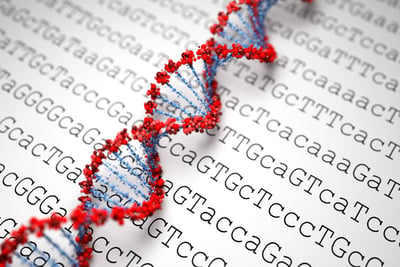FORCE's eXamining the Relevance of Articles for You (XRAY) program looks behind the headlines of cancer news to help you understand what the research means for you.
XRAY is a reliable source of hereditary cancer research-related news and information.
Learn more about the XRAY program
Breast Cancer
Relevance: Medium-High


Strength of Science: High


Research Timeline: Human Research


Study : A new breast cancer drug improves overall survival among people with brain and other metastases
Relevance: Medium-High


Strength of Science: High


Research Timeline: Human Research


Most relevant for: People with metastatic breast cancer
A promising new drug called tucatinib combined with standard therapy shows benefit for women with HER2-positive metastatic breast cancer. Women who took tucatinib experienced longer progression-free survival (time before their cancer worsened), longer overall survival time and response of cancer (shrinking or disappearing). Strikingly, better outcomes were also seen for women with brain metastases, which is often difficult to treat. (12/20/19)
THIS INFORMATION HAS BEEN UPDATED on 04/17/20: The U.S. Food and Drug Administration has approved Tukysa (tucatinib) for use in combination with trastuzumab (Herceptin) and capecitabine for patients with advanced or metastatic HER2-positive breast cancer, including patients with brain metastases (disease that has spread to the brain). Patients who have received one or more treatments targeting Her2 in the metastic setting are eligible to receive Tukysa. Tukysa is an oral (tablet) tyrosine kinase inhibitor which is taken twice daily.
Read More

Relevance: High


Strength of Science: High


Research Timeline: Post Approval


Study : Women who exercise have lower breast cancer risk whether or not they have a family history of breast cancer
Relevance: High


Strength of Science: High


Research Timeline: Post Approval


Most relevant for: Young, high risk women
The effect of physical activity on breast cancer risk was looked at in a study of over 15,000 women. The results suggest that exercise lowers breast cancer risk regardless of family history of breast cancer or menopausal status. (12/6/19)
Este artículo está disponible en español.
Read More
Relevance: Medium-High


Strength of Science: Medium-High


Research Timeline: Human Research


Study : A new blood test may help predict early-stage breast cancer patients at highest risk for recurrence
Relevance: Medium-High


Strength of Science: Medium-High


Research Timeline: Human Research


Most relevant for: People with early-stage breast cancer
Which patients are at risk for a relapse of early-stage breast cancer? Tests to predict recurrence would help find people who need more monitoring after treatment and provide a chance to find and treat them earlier. This study looked at whether a blood test for tumor DNA (called circulating tumor DNA or ctDNA) is useful for finding people with recurrence earlier than current clinical practice. (11/4/19)
Este artículo está disponible en español.
Read More
Relevance: Medium-Low


Research Timeline: Human Research


Personal Story : A “flu shot” against breast cancer? Not so fast
Relevance: Medium-Low


Research Timeline: Human Research


Most relevant for: Women diagnosed with Ductal Carcinoma In Situ (DCIS)
There have been multiple reports in the media of a Florida woman who had a "shot" to treat her DCIS with a promising outcome. This XRAY reviews the underlying story about this early breast cancer vaccine trial. (10/25/19)
Read More
Relevance: High


Quality of Writing: High


Personal Story : Running marathons with metastatic breast cancer? Yes!
Most relevant for: Women with metastatic breast cancer
Runner’s World Magazine featured Sarah Smith, a metastatic breast cancer patient who runs marathons and ultra-marathons. By telling her story, Sarah wants to encourage people to stay active, despite the challenges that life may bring. (10/13/19)
Read More
Relevance: Medium-High


Strength of Science: Medium-High


Research Timeline: Human Research


Study : Research on the PARP inhibitor talazoparib (Talzenna) for early-stage breast cancer is promising
Relevance: Medium-High


Strength of Science: Medium-High


Research Timeline: Human Research


Most relevant for: People with early stage breast cancer who have an inherited BRCA mutation
The PARP inhibitor talazoparib (Talzenna) has been useful for treatment of advanced or metastatic breast cancer for patients with BRCA mutations. A preliminary study showed that the majority of patients who took talazoparib alone before surgery for early-stage breast cancer had effective treatment and manageable side effects. Expanded clinical trials are in progress to verify this result. (10/4/19)
Read More
Relevance: Medium-High


Strength of Science: Medium


Research Timeline: Post Approval


Study : Inherited mutations in metastatic breast cancer patients
Relevance: Medium-High


Strength of Science: Medium


Research Timeline: Post Approval


Most relevant for: People with metastatic breast cancer
Recent research shows that a significant portion of patients with metastatic breast cancer have harmful mutations in a gene associated with hereditary breast cancer and increased breast cancer risk. (9/26/19)
Read More
Relevance: Medium-High


Research Timeline: Post Approval


Guideline : FDA issues warning on CDK inhibitors
Most relevant for: People currently taking a CDK inhibitor
The U.S. Food and Drug Administration issued a safety alert for CDK inhibitors, including Ibrance (palbociclib), Kisqali (ribociclib), and Verzenio (abemaciclib). (9/24/19)
Read More
Relevance: Medium-High


Strength of Science: Medium-High


Study : Does eating meat affect breast cancer risk?
Most relevant for: Women with a family history of breast cancer
Eating meat has been suggested to increase breast cancer risk. The recent Sister Study looked at meat type, cooking methods and breast cancer risk in a study of 42,012 women. (9/10/19)
Read More.jpg)
Relevance: High


Strength of Science: High


Research Timeline: Post Approval


Study : Is it safe for BRCA mutation carriers to become pregnant following breast cancer?
Relevance: High


Strength of Science: High


Research Timeline: Post Approval


Most relevant for: Women with a BRCA mutation who are considering pregnancy after breast cancer
New research shows that pregnancy after breast cancer is safe for women with BRCA mutations and their babies. (9/4/19)
Read More